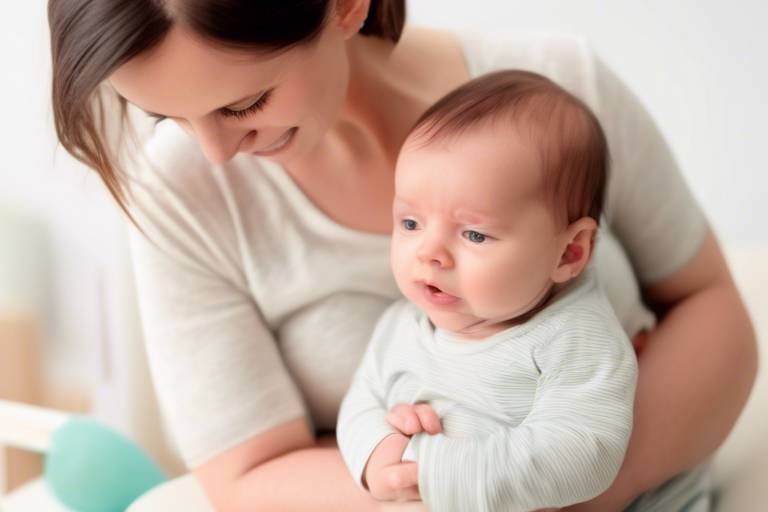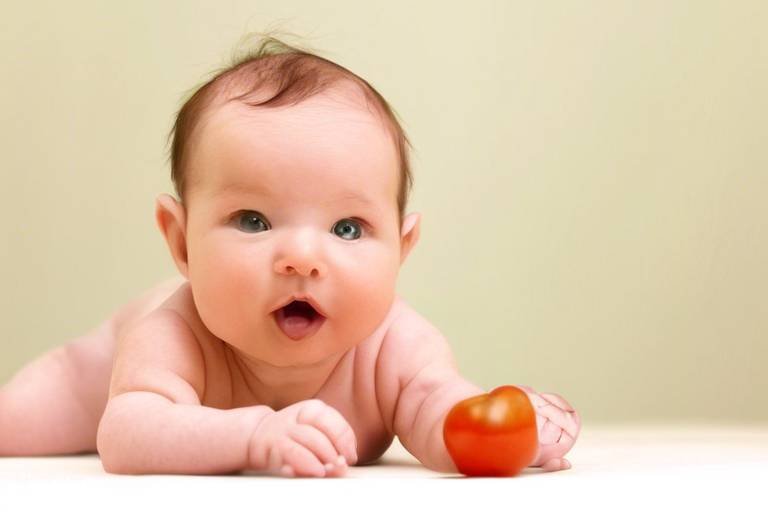Preparing for Your Baby's Arrival: An Essential Health Checklist
Welcoming a new life into the world is one of the most exciting and overwhelming experiences a parent can go through. The journey of pregnancy is filled with anticipation, joy, and a whole lot of preparation. To help you navigate this new chapter, we’ve created a comprehensive health checklist that covers everything from prenatal care to postpartum recovery. This isn’t just a list of tasks; it’s your roadmap to ensuring both you and your baby are healthy and ready for this beautiful adventure ahead. So, let’s dive in and explore the essential steps you need to take to prepare for your little one’s arrival!
First things first, let’s talk about prenatal care. This is not just a fancy term; it’s a vital part of your pregnancy journey. Regular check-ups are crucial for monitoring the health of both you and your baby. These visits allow your healthcare provider to track the baby’s growth, perform necessary tests, and address any potential issues before they become serious. Think of prenatal care as your safety net, catching any concerns early on and ensuring a smoother pregnancy experience. So, don’t skip those appointments! They are your golden tickets to a healthy pregnancy.
Now, let’s move on to something equally important—nutrition. A balanced diet during pregnancy is not just about eating for two; it’s about eating right. Your body needs a variety of nutrients to support the incredible work it’s doing. Essential vitamins and minerals play a significant role in fetal development, and understanding what your body craves can make a world of difference. Imagine your body as a garden; the more you nourish it with the right foods, the more it can flourish. So, what should you be munching on? Let’s break it down.
When it comes to vitamins and supplements, some are non-negotiable. Folic acid, for instance, is a superstar nutrient that helps prevent neural tube defects. Iron is another crucial player, supporting increased blood volume and preventing anemia. Here’s a quick rundown of the vitamins you should consider incorporating into your daily routine:
| Vitamin | Benefits |
|---|---|
| Folic Acid | Prevents neural tube defects |
| Iron | Supports blood volume and energy levels |
| Calcium | Strengthens bones and teeth |
| Omega-3 Fatty Acids | Supports brain development |
Staying hydrated is another key aspect of a healthy pregnancy. Water is essential for your body to function properly, especially now that you’re nurturing a tiny human. Proper hydration helps maintain amniotic fluid levels, supports nutrient transport, and can even help alleviate common pregnancy discomforts like swelling and constipation. Aim for at least 8-10 cups of water a day, and don’t forget to listen to your body—if you’re thirsty, drink up!
As much as we focus on what to include in your diet, it’s equally important to consider what to avoid. Certain substances can be harmful to fetal development, and being mindful of these can ensure a healthier pregnancy. Steer clear of:
- Alcohol: No amount is considered safe during pregnancy.
- Caffeine: Limit intake to reduce risks of complications.
- Raw or undercooked foods: These can harbor harmful bacteria.
- Processed foods: Often high in sugars and unhealthy fats.
Let’s not forget about your mental health! Pregnancy can be a rollercoaster of emotions, and managing stress is crucial for both you and your baby. Finding ways to relax and unwind can lead to a more positive experience. Whether it’s through yoga, meditation, or simply taking time for yourself, prioritize your emotional well-being. After all, a happy mom equals a happy baby!
Once you’ve tackled your health checklist, it’s time to turn your attention to your home. Creating a safe and welcoming environment is essential for your newborn. Start by decluttering and organizing your space to make room for all the baby gear. Think of your home as a cozy nest where your baby can thrive!
Knowing what baby gear is necessary can feel overwhelming, but it doesn’t have to be. Here’s a quick list of must-have items to consider before your little one arrives:
- Crib or bassinet: A safe sleep space is non-negotiable.
- Diapers: Stock up on both disposable and cloth options.
- Baby clothes: Soft, comfortable clothing is key.
- Car seat: Essential for safe travels.
Speaking of sleep, let’s discuss how to create a safe sleep environment for your newborn. The American Academy of Pediatrics recommends placing your baby on their back to sleep, using a firm mattress, and keeping the crib free of soft bedding and toys. A safe sleep space is critical for reducing the risk of Sudden Infant Death Syndrome (SIDS). Remember, safety first!
Q: What should I pack in my hospital bag?
A: Include essentials like comfortable clothing, toiletries, snacks, and items for the baby like an outfit and a blanket.
Q: How can I prepare for postpartum recovery?
A: Stock up on postpartum supplies, including pads, ice packs, and comfortable clothing. Don’t hesitate to ask for help from friends and family!
Q: When should I start prenatal visits?
A: It’s best to schedule your first prenatal visit as soon as you find out you’re pregnant, ideally around 8 weeks into your pregnancy.

Understanding Prenatal Care
This article provides a comprehensive health checklist to help expectant parents prepare for their baby's arrival, covering essential topics from prenatal care to postpartum recovery.
Prenatal care is not just a series of doctor visits; it’s a vital lifeline for both the mother and the baby. Think of it as a roadmap guiding you through the incredible journey of pregnancy. Regular check-ups help monitor the pregnancy and address any potential issues early on, ensuring both you and your baby are healthy and thriving. During these visits, healthcare providers can track the baby's development, check for any abnormalities, and provide you with the necessary guidance to navigate this transformative time.
But what exactly happens during prenatal visits? Typically, these appointments include a variety of essential assessments:
- Blood Pressure Monitoring: Keeping an eye on your blood pressure is crucial as high levels can indicate complications.
- Weight Checks: Tracking weight gain helps ensure you are on the right path for a healthy pregnancy.
- Ultrasounds: These magical moments allow you to see your baby and monitor their growth and development.
- Blood Tests: These tests can screen for conditions like anemia or gestational diabetes, giving you peace of mind.
Additionally, prenatal care is a great opportunity to discuss any questions or concerns you may have. Whether it’s about morning sickness, exercise, or what to expect during labor, your healthcare provider is there to support you. Remember, it’s perfectly normal to feel a mix of excitement and anxiety during this time. Open communication with your doctor can help alleviate fears and provide clarity.
As you embark on this journey, it’s essential to stay informed. Research shows that women who receive regular prenatal care are less likely to experience complications during pregnancy and childbirth. It’s like having a safety net; it gives you the confidence to enjoy this beautiful phase of life. So, don’t skip those appointments!
Prenatal care also involves lifestyle adjustments that can significantly enhance your health and well-being. Here are a few tips to consider:
- Stay Active: Engaging in moderate exercise, like walking or prenatal yoga, can boost your mood and energy levels.
- Educate Yourself: Attend prenatal classes to learn about childbirth and newborn care. Knowledge is power!
- Stay Connected: Surround yourself with supportive friends and family who can offer encouragement and help.
In conclusion, understanding prenatal care is pivotal for a healthy pregnancy. It’s about more than just physical health; it’s about nurturing your emotional and mental well-being too. So, embrace this journey with open arms, and remember that every step you take towards caring for yourself is a step towards caring for your little one.
Here are some common questions regarding prenatal care:
- How often should I see my doctor during pregnancy? Typically, you should have monthly visits during the first 28 weeks, bi-weekly visits from 28 to 36 weeks, and weekly visits from 36 weeks until delivery.
- What should I ask during my prenatal visits? Don’t hesitate to ask about any concerns, nutrition, exercise, and what to expect during labor.
- Are there any tests I should expect? Yes, routine blood tests, ultrasounds, and screenings for conditions like gestational diabetes are common.

Nutrition for Expecting Mothers
When it comes to , it's not just about eating for two; it's about eating right for two! A balanced diet during pregnancy is crucial for fetal development and the overall health of the mother. Think of your body as a garden; the nutrients you provide are the seeds that will help your baby grow strong and healthy. So, what should you be planting in your diet? Let's dig into the essentials!
First and foremost, it's important to focus on a variety of food groups to ensure you're getting all the necessary nutrients. This means incorporating plenty of fruits and vegetables, lean proteins, whole grains, and healthy fats into your meals. For instance, colorful fruits and veggies not only provide vitamins but also antioxidants, which are essential for combating oxidative stress during pregnancy. Imagine your body as a fortress; these nutrients are your armor, protecting both you and your baby!
One of the most critical components of a pregnant woman's diet is folic acid. This B-vitamin is vital in preventing neural tube defects in the developing baby. It’s found in leafy greens, citrus fruits, beans, and fortified cereals. Alongside folic acid, iron is another nutrient that should not be overlooked. It helps in the production of hemoglobin, which carries oxygen to your baby. Foods rich in iron include red meat, poultry, fish, lentils, and spinach. Pairing these iron-rich foods with vitamin C sources like oranges or bell peppers can enhance absorption, making your meals even more powerful!
Now, let’s talk about calcium. This mineral is essential for the development of your baby's bones and teeth. Expecting mothers should aim for about 1,000 mg of calcium daily. Dairy products like milk, yogurt, and cheese are excellent sources, but if you're lactose intolerant, consider alternatives such as fortified plant-based milks or leafy greens. By ensuring adequate calcium intake, you're laying down a strong foundation for your baby's future!
While a well-balanced diet is the best way to get your nutrients, sometimes it’s necessary to supplement. Prenatal vitamins are specifically designed to fill any gaps in your nutrition. Look for those that contain folic acid, iron, calcium, and omega-3 fatty acids. Omega-3s are crucial for brain development and can be found in fish oil supplements or plant-based options like flaxseeds. Remember, though, to consult with your healthcare provider before starting any new supplements.
Staying hydrated is another key aspect of nutrition during pregnancy. Water plays a vital role in nutrient transport, digestion, and even in reducing pregnancy-related discomforts like swelling and constipation. Aim for at least 8-10 glasses of water a day. Think of water as the lifeblood of your garden; without it, everything wilts!
While focusing on what to include in your diet, it’s equally important to consider what to avoid. Steering clear of certain substances is crucial for a healthy pregnancy. This includes limiting caffeine intake, avoiding alcohol, and steering clear of raw or undercooked seafood, eggs, and meats. These choices can significantly impact fetal development and overall health. Just like you wouldn’t want weeds choking your garden, you want to eliminate anything that could harm your baby’s growth!
In conclusion, the nutrition you provide during pregnancy is a powerful tool in nurturing your baby's health. By prioritizing a balanced diet rich in essential nutrients, staying hydrated, and avoiding harmful substances, you’re not just preparing for your baby’s arrival; you’re giving them the best possible start in life.
- What are the best sources of protein during pregnancy? Lean meats, poultry, fish, eggs, beans, and legumes are excellent sources of protein.
- How can I manage cravings in a healthy way? Opt for healthier alternatives or indulge in moderation. For example, if you're craving sweets, try fruit or yogurt instead of candy.
- Is it safe to follow a vegetarian or vegan diet during pregnancy? Yes, but it's essential to ensure you're getting enough protein, iron, calcium, and vitamin B12 from plant-based sources or supplements.

Essential Vitamins and Supplements
When you’re expecting, it’s not just about the adorable baby clothes or the cute nursery decor; nutrition is paramount. One of the most significant aspects of a healthy pregnancy is ensuring that you’re getting the right vitamins and supplements. These nutrients are essential for the development of your baby and the well-being of your body. Think of them as the building blocks that support your baby's growth while also keeping you energized and healthy.
First and foremost, folic acid is a superstar when it comes to prenatal vitamins. This B-vitamin plays a crucial role in preventing neural tube defects, which can affect your baby's brain and spine. It’s recommended that you start taking folic acid before conception and continue throughout your pregnancy. Aim for at least 400 to 800 micrograms daily. You can find folic acid in leafy greens, nuts, and fortified cereals, but a supplement ensures you’re getting enough.
Next on the list is iron. During pregnancy, your blood volume increases significantly, and iron is vital for producing hemoglobin, which helps carry oxygen to your growing baby. Insufficient iron can lead to anemia, leaving you feeling fatigued and weak. The recommended daily intake is about 27 milligrams. Good sources of iron include red meat, poultry, fish, and legumes. If you're vegetarian or vegan, consider pairing non-heme iron sources (like beans or spinach) with vitamin C-rich foods (like oranges or bell peppers) to enhance absorption.
In addition to folic acid and iron, calcium is essential for developing your baby's bones and teeth. Aim for about 1,000 milligrams of calcium daily. Dairy products, leafy greens, and fortified plant-based milks are excellent sources. If you’re not getting enough calcium, a supplement can help fill the gap.
Don’t forget about omega-3 fatty acids, particularly DHA (docosahexaenoic acid). These healthy fats are crucial for your baby's brain development. Aim for at least 200-300 milligrams of DHA daily, which you can find in fatty fish like salmon or through high-quality fish oil supplements. If you're concerned about mercury exposure from fish, look for supplements derived from algae, which are a safe alternative.
Lastly, it’s essential to maintain a balanced diet alongside these supplements. While they are incredibly beneficial, they should not replace whole foods. Think of your diet as a rainbow; the more colorful your plate, the more nutrients you're likely getting. Incorporate a variety of fruits, vegetables, whole grains, and lean proteins to ensure you're covering all your nutritional bases.
Here's a quick overview of the essential vitamins and their daily recommended amounts:
| Vitamin/Supplement | Recommended Daily Amount | Sources |
|---|---|---|
| Folic Acid | 400-800 mcg | Leafy greens, nuts, fortified cereals |
| Iron | 27 mg | Red meat, poultry, fish, legumes |
| Calcium | 1,000 mg | Dairy, leafy greens, fortified plant-based milks |
| Omega-3 (DHA) | 200-300 mg | Fatty fish, algae-based supplements |
In summary, prioritizing your health through the right vitamins and supplements can set the stage for a healthy pregnancy and a thriving baby. Always consult with your healthcare provider before starting any new supplements, as they can provide personalized advice tailored to your specific needs. Remember, a well-nourished mom often leads to a well-nourished baby!
- What should I do if I can't keep my prenatal vitamins down? - Talk to your doctor about alternative options or different formulations that may be easier on your stomach.
- Can I get all my vitamins from food? - While a balanced diet is crucial, some women may still need supplements to meet their nutritional needs during pregnancy.
- Are there any vitamins I should avoid during pregnancy? - Yes, avoid high doses of vitamin A and certain herbal supplements unless recommended by your healthcare provider.

Hydration and Its Importance
Staying hydrated during pregnancy is not just a suggestion; it's a necessity for both the mother and the developing baby. Think of hydration as the foundation of a sturdy house; without it, everything else can start to crumble. Water plays a vital role in various bodily functions, including nutrient transportation, temperature regulation, and waste elimination. When you're pregnant, your body requires even more fluids to support the growing life within you.
As your blood volume increases to nourish your baby, you may find that you need to drink more water than usual. Experts recommend that pregnant women aim for at least 8-10 cups of water each day. This may vary based on your activity level, climate, and overall health, but the key is to listen to your body. If you feel thirsty, drink up! Thirst is your body's way of signaling that it needs more fluids.
Not only does proper hydration keep your body functioning optimally, but it also helps alleviate some common pregnancy discomforts. For example, drinking enough water can reduce the chances of constipation, which is a frequent issue during pregnancy. It can also help prevent urinary tract infections (UTIs), which pregnant women are more prone to. So, consider hydration as your secret weapon against these pesky problems!
But wait, there’s more! Staying well-hydrated can also help with swelling and fatigue. When your body is adequately hydrated, it can better manage fluid retention, which often leads to swollen feet and ankles. Additionally, hydration can combat fatigue by ensuring that your body has the energy it needs to keep you active and engaged throughout your pregnancy.
Now, you might be wondering how to make hydration a part of your daily routine. Here are some tips:
- Carry a water bottle: Keep a reusable water bottle with you at all times. This not only reminds you to drink but also makes it convenient.
- Infuse your water: If plain water feels boring, try adding slices of fruits like lemon, lime, or cucumber for a refreshing twist.
- Eat water-rich foods: Incorporate foods with high water content, such as cucumbers, watermelon, and oranges, into your diet.
In conclusion, hydration is a simple yet powerful way to support your health and your baby's development during pregnancy. By making a conscious effort to drink enough fluids, you'll be setting the stage for a healthier, happier pregnancy journey.
Q: How can I tell if I'm drinking enough water during pregnancy?
A: One of the simplest ways to check your hydration level is by observing the color of your urine. Light yellow or clear urine typically indicates proper hydration, while dark yellow urine may suggest that you need to drink more fluids.
Q: Are there any drinks I should avoid while pregnant?
A: Yes, it's best to limit or avoid drinks with high caffeine content, sugary sodas, and alcohol, as they can be harmful to both you and your baby.
Q: Can I drink herbal teas during pregnancy?
A: Some herbal teas are safe, while others may not be recommended. Always consult your healthcare provider before adding herbal teas to your diet.

Avoiding Harmful Substances
When it comes to pregnancy, the phrase "you are what you eat" takes on a whole new meaning. It's not just about what you consume; it's also about what you expose yourself to. Expectant mothers need to be particularly vigilant about avoiding harmful substances that could jeopardize their baby's development. This means making informed choices about everything from food to environmental factors. For instance, did you know that certain foods can be detrimental during pregnancy? It's crucial to steer clear of raw or undercooked meats, unpasteurized dairy products, and certain types of fish that are high in mercury, such as shark and swordfish. These can pose serious risks to your baby's health.
Moreover, let's not forget about the importance of environmental factors. Household cleaners, pesticides, and even some beauty products can contain chemicals that are harmful to both you and your baby. Opting for natural or organic products is a great way to minimize your exposure to these potential hazards. You might be surprised to learn that even some common medications can be off-limits during pregnancy. Always consult with your healthcare provider before taking any medication, whether it's over-the-counter or prescription.
Here are some other substances to avoid:
- Alcohol: There is no known safe amount of alcohol during pregnancy, so it's best to avoid it entirely.
- Caffeine: While moderate caffeine intake is generally considered safe, it's wise to limit consumption to less than 200 mg per day.
- Tobacco: Smoking during pregnancy can lead to low birth weight and other complications.
Additionally, it's important to be mindful of your mental environment. Stressful situations can lead to the release of harmful hormones that may affect your pregnancy. Surrounding yourself with supportive friends and family can create a more positive atmosphere. Remember, your emotional health is just as important as your physical health during this time.
In summary, avoiding harmful substances is a multifaceted approach that requires diligence and awareness. By making conscious choices about what you consume and the environment you create, you can significantly contribute to a healthier pregnancy and a thriving baby. Stay informed, consult with your healthcare provider regularly, and don't hesitate to reach out for support when needed.
Q1: What should I do if I accidentally consume something harmful?
A1: Don't panic! Contact your healthcare provider immediately for guidance. They can assess the situation and provide you with the necessary steps to take.
Q2: Are there any safe alternatives to common household cleaners?
A2: Absolutely! Consider using vinegar, baking soda, and essential oils as natural cleaning agents that are safer for both you and your baby.
Q3: Is it safe to use beauty products during pregnancy?
A3: It's essential to check the ingredients in your beauty products. Look for items that are labeled as safe for pregnancy or consult with your doctor for recommendations.

Emotional Well-being During Pregnancy
Pregnancy is a beautiful journey, but let's be real: it can also be a rollercoaster of emotions! From the joy of hearing your baby's heartbeat for the first time to the anxiety of preparing for labor, the emotional ups and downs are completely normal. It's essential to prioritize your emotional well-being during this transformative time. After all, a happy mom often leads to a happy baby!
One of the first steps in maintaining your emotional health is to openly communicate your feelings. Whether it's with your partner, friends, or a support group, sharing your experiences can lighten the load. Have you ever noticed how simply talking about your worries can make them feel less overwhelming? It's like taking a deep breath after holding it in for too long!
Another crucial aspect is to embrace self-care. This doesn't mean you need to indulge in lavish spa days (although, who wouldn't want that?), but rather, find small moments throughout your day to nurture yourself. It could be as simple as enjoying a warm bath, indulging in your favorite book, or even taking a leisurely walk in the park. Remember, you can't pour from an empty cup, so filling yours is vital.
Stress management techniques can also play a significant role in enhancing your emotional well-being. Consider incorporating practices such as:
- Meditation: Just a few minutes a day can help clear your mind and reduce anxiety.
- Yoga: This gentle exercise can help improve your mood and keep your body flexible.
- Journaling: Writing down your thoughts can be a powerful outlet for your feelings.
Furthermore, don't hesitate to seek professional help if you're feeling persistently down or anxious. Speaking to a therapist or counselor who specializes in maternal mental health can provide you with the tools and support you need. It's okay to ask for help; in fact, it's a sign of strength! Just like you wouldn't hesitate to consult a doctor for physical ailments, your mental health deserves the same attention.
Lastly, surround yourself with positivity. Whether it's through uplifting podcasts, inspiring books, or supportive friends, the energy you consume can significantly impact your emotional state. Think of it as curating your own little bubble of happiness. You have the power to create an environment that nurtures your spirit and keeps you grounded.
In conclusion, taking care of your emotional well-being during pregnancy is just as important as monitoring your physical health. By prioritizing self-care, communicating your feelings, and seeking help when needed, you can navigate this incredible journey with more confidence and joy. Remember, you're not alone in this; many mothers share similar experiences, and together, we can support one another!
Q: Is it normal to feel anxious during pregnancy?
A: Yes, it's completely normal to experience anxiety during pregnancy due to the many changes happening in your life. It's essential to talk about these feelings and seek support if needed.
Q: How can I practice self-care during pregnancy?
A: Self-care can include activities like taking warm baths, reading, practicing yoga, or simply enjoying quiet time. Find what makes you feel relaxed and happy!
Q: When should I seek professional help for my emotional health?
A: If you find yourself feeling persistently sad, anxious, or overwhelmed, it might be time to consult a mental health professional. They can provide guidance and support tailored to your needs.

Preparing Your Home for Baby
When you're expecting a little one, preparing your home becomes an exciting yet daunting task. It's like setting the stage for a beautiful play, where your baby is the star! You want everything to be just right, from the nursery to the safety measures. Creating a safe and welcoming environment is essential for your newborn's health and well-being. Let's dive into some practical tips and considerations to ensure your home is ready for this new chapter in your life.
First things first, you’ll want to designate a space for the baby. This is often a nursery, but it doesn’t have to be a separate room. You can convert a corner of your bedroom or even a small area in your living space into a cozy nook for your little one. The key is to make it comfortable and functional. Think about the essentials like a crib, changing table, and storage for baby clothes and supplies. Remember, less is often more. You don’t need to fill the space with unnecessary items; focus on what you truly need.
Next up, let’s talk about safety. Babies are naturally curious, and as they start to explore, you’ll want to ensure your home is baby-proofed. This includes securing furniture to walls, covering electrical outlets, and removing any choking hazards. You might consider creating a baby-proofing checklist to keep track of what needs to be done. Here’s a quick table to help you get started:
| Area | Safety Measures |
|---|---|
| Living Room | Secure furniture, remove small objects, use corner guards |
| Kitchen | Lock cabinets, keep sharp objects out of reach |
| Bathroom | Use non-slip mats, keep medications out of reach |
| Bedroom | Ensure crib is safe, remove heavy blankets |
Once you have the safety measures in place, it’s time to think about the essentials. Knowing what baby gear is necessary can be overwhelming, but it doesn’t have to be. Here are some must-have items to consider:
- Crib or bassinet: A safe sleeping space is crucial.
- Changing table: Makes diaper changes easier.
- Baby monitor: Helps you keep an eye (or ear) on your baby.
- Diaper bag: Essential for outings.
Additionally, creating a comfortable sleep environment is critical for your newborn. Research shows that babies sleep best in a dark, quiet room, so consider blackout curtains and a white noise machine to help them drift off. Make sure the crib meets all safety standards, and always place your baby on their back to sleep. It’s a simple yet effective way to reduce the risk of Sudden Infant Death Syndrome (SIDS).
Finally, don’t forget to stock up on essentials for those first few weeks. Having diapers, wipes, and baby clothes readily available will make your transition smoother. You might even want to set up a small station with all the necessities in your living area, so you’re not running back and forth during those busy days and sleepless nights.
Preparing your home for your baby can feel like a whirlwind, but remember, it’s all part of the journey. Take it one step at a time, and soon enough, your home will be a warm and inviting space for your little miracle!
Q: When should I start preparing my home for the baby?
A: It’s best to start preparing your home during the second trimester. This gives you ample time to ensure everything is ready before the baby arrives.
Q: How can I ensure my baby’s sleep area is safe?
A: Always use a crib that meets current safety standards, avoid heavy blankets, and ensure the mattress fits snugly in the crib. Always place your baby on their back to sleep.
Q: What are some must-have items for new parents?
A: Essentials include a crib, changing table, baby monitor, and a diaper bag. Focus on items that will make your life easier and keep your baby comfortable.

Essential Baby Gear
Preparing for your baby's arrival can feel like gearing up for a major expedition. You might be wondering, "What do I really need?" The truth is, the world of baby gear can be overwhelming, but fear not! Understanding what’s essential can make all the difference in creating a nurturing environment for your little one. Think of it as packing your suitcase for a trip; you want to include only the essentials that will make your journey smoother.
First and foremost, a safe crib is non-negotiable. Your baby will spend a significant amount of time sleeping, so ensuring they have a safe, comfortable space is crucial. Look for cribs that meet current safety standards and consider a crib mattress that is firm and fits snugly. Alongside the crib, investing in a swaddle blanket can help your newborn feel secure and cozy, mimicking the warmth of the womb.
Next on the list is a car seat. This is not just a piece of gear; it’s a lifesaver. Hospitals typically won’t let you leave without one, so make sure you choose a model that is both safe and easy to install. Don’t forget to practice installing it in your car before the big day! It’s like rehearsing for a performance; the more prepared you are, the smoother it will go.
Another essential item is a diaper bag. Think of it as your baby’s travel kit. You’ll want one that’s spacious yet organized to carry all those baby essentials, from diapers and wipes to bottles and snacks. Look for a bag with multiple compartments so you can easily find what you need without digging through a bottomless pit.
When it comes to feeding, whether you choose to breastfeed or bottle-feed, having a breast pump or a good set of bottles is key. If breastfeeding, a pump can help you build a stash and allow others to help with feeding. If you’re bottle-feeding, opt for bottles that are designed to reduce colic, making feeding time a little less stressful for both you and your baby.
For those moments when you need to keep your baby close while still getting things done around the house, a baby carrier can be a game changer. It allows you to have your hands free while keeping your baby snug against you. It’s like having a personal assistant who’s always by your side—just a tiny, adorable one!
Finally, consider a baby monitor. This provides peace of mind, allowing you to keep an ear (or eye) on your little one while they sleep. With options ranging from audio monitors to high-tech video systems, you can choose what works best for your family. It’s like having a superhero sidekick watching over your baby while you take a breather.
To summarize, here’s a quick table of essential baby gear to consider:
| Item | Purpose |
|---|---|
| Crib | Safe sleeping space for the baby |
| Car Seat | Ensures baby’s safety during travel |
| Diaper Bag | Convenient storage for baby essentials |
| Breast Pump/Bottles | Facilitates feeding |
| Baby Carrier | Allows hands-free carrying of the baby |
| Baby Monitor | Monitors baby while they sleep |
In conclusion, while the list of baby gear can seem endless, focusing on these essentials will help you create a nurturing environment for your new arrival. Remember, it’s not about having every gadget on the market; it’s about ensuring that you have what you need to keep your baby safe, comfortable, and happy. So, take a deep breath, enjoy the process, and get ready for the most rewarding adventure of your life!
- What is the most important baby gear item? The crib is crucial for safe sleep.
- Do I need a fancy diaper bag? No, a functional bag with enough space and compartments is what matters.
- How do I choose a car seat? Look for safety ratings and ease of installation.
- Is a baby monitor necessary? While not essential, it provides peace of mind.

Creating a Safe Sleep Environment
Creating a safe sleep environment for your newborn is one of the most important tasks you'll undertake as a new parent. With all the excitement and anticipation surrounding your baby's arrival, it’s easy to overlook the essentials of safe sleeping. Remember, a well-prepared sleep area can significantly reduce the risk of sleep-related incidents, such as Sudden Infant Death Syndrome (SIDS). So, how can you ensure your little one sleeps soundly and safely?
First and foremost, your baby's sleep area should be free from any potential hazards. This means no soft bedding, toys, or bumper pads in the crib. Instead, opt for a firm mattress that fits snugly within the crib frame. The American Academy of Pediatrics recommends using a fitted sheet specifically designed for the mattress, as it minimizes the risk of suffocation. It's like creating a cozy little fortress, where your baby can feel secure without any unnecessary risks!
Additionally, the position in which your baby sleeps is crucial. Always place your baby on their back for every sleep time, whether it's during the night or a nap. It’s a simple yet effective practice that can significantly lower the risk of SIDS. Think of it as giving your baby a gentle nudge towards safer sleep habits. You might feel tempted to let them sleep on their tummy, especially if they seem more comfortable that way, but resist the urge! Consistency is key in developing safe sleep practices.
Temperature control is another essential factor. Babies are sensitive to temperature changes, and overheating can be a risk factor for SIDS. Aim for a comfortable room temperature, ideally between 68°F and 72°F (20°C to 22°C). Dress your baby in light sleep clothing, and consider using a sleep sack instead of blankets, which can easily become entangled. Just imagine your baby drifting off to dreamland in a cozy, breathable cocoon!
Finally, keep the sleep area as calm and quiet as possible. Consider using a white noise machine or a soft lullaby to help soothe your baby to sleep. This can create a peaceful atmosphere that mimics the comforting sounds of the womb, making it easier for your little one to drift off. However, ensure that any devices used are placed safely out of reach.
In summary, creating a safe sleep environment is about being proactive. By following these guidelines, you can provide your newborn with a secure and comfortable place to rest. Remember, safety first! Your attention to these details can make all the difference in ensuring your baby has a peaceful night's sleep.
Here are some common questions new parents often have regarding their baby's sleep environment:
- What should my baby sleep on? - A firm mattress covered with a fitted sheet is ideal. Avoid soft bedding.
- Can I use blankets in the crib? - It's best to avoid blankets. Instead, use a sleep sack for warmth.
- What is the safest sleep position for my baby? - Always place your baby on their back to sleep.
- How can I prevent my baby from overheating? - Keep the room at a comfortable temperature and dress your baby in light clothing.
Frequently Asked Questions
- What is prenatal care and why is it important?
Prenatal care refers to the regular check-ups and medical attention that expecting mothers receive throughout their pregnancy. It's essential because it helps monitor the health of both the mother and the baby, allowing healthcare providers to identify and address any potential issues early on. Think of it as a roadmap to a healthy pregnancy!
- What nutrients should I focus on during pregnancy?
During pregnancy, it's crucial to maintain a balanced diet rich in essential nutrients. Key nutrients include folic acid, iron, calcium, and omega-3 fatty acids. These components support fetal development and help the mother stay healthy. Imagine your body as a garden; the right nutrients are the water and sunlight that help it flourish!
- How much water should I drink while pregnant?
Staying hydrated is vital during pregnancy. Aim for at least 8-10 cups (64-80 ounces) of water daily. Proper hydration supports your body's increased blood volume and aids in nutrient transport to your baby. Think of water as the lifeblood of your pregnancy journey!
- What substances should I avoid during pregnancy?
It's important to steer clear of harmful substances during pregnancy, such as alcohol, tobacco, and certain medications. These can negatively impact fetal development. Consider this your protective shield; avoiding these substances helps create a safe environment for your baby to grow!
- How can I manage stress during pregnancy?
Managing stress is crucial for your emotional well-being during pregnancy. Techniques such as prenatal yoga, meditation, and deep breathing can be incredibly beneficial. Picture your mind as a calm lake; these practices help keep the surface smooth and serene amidst the waves of life!
- What baby gear do I really need?
The list of baby gear can feel endless, but focus on the essentials. Must-have items include a crib, car seat, stroller, and diapers. Think of these items as the foundation of your baby's new world; they provide safety and comfort as your little one arrives!
- How can I create a safe sleep environment for my newborn?
To create a safe sleep environment for your baby, ensure the crib meets safety standards, use a firm mattress, and keep the crib free of soft bedding and toys. This is like building a fortress for your baby; a secure sleep space promotes safe and restful nights!



















